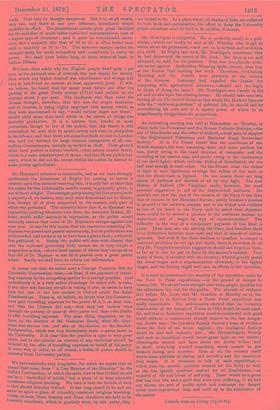An interesting meeting was held at Manchester on Monday, in
which both the Protestant and the Roman Catholic Bishops,—the one of Manchester and the other of Salford,—took part, to support " the Shipwrecked Fishermen and Mariners' Royal Benevolent Society." In it Dr. Fraser stated that the conditions of the British seaman's life were becoming more and more perilous for him, partly owing to the rapid increase of commerce and the crowding of our narrow seas, and partly owing to the inadequacy of our shore lights; which, said the Bishop of Manchester, are not half near enough to each other. On the French coast the radius of light of each lighthouse overlaps the radius of the next, so that the whole coast is lighted. On our coasts there are long spaces of darkness not reached at all by any light. The new Bishop of Salford (Dr. Vaughan) made, however, the most practical suggestion in aid of the shipwrecked mariners. lie pointed out that the pay of the seamen of the Navy is less than that of seamen in the Merchant Service, partly because a pension is secured to the outworn seaman and to his widow and children in case of his death in the Navy, and he asked what objection there would be to secure a pension to the merchant seaman by deductions out of wages by way of superannuation*? The difficulty in the way of a compulsory payment of this kind is plain. These men are not serving the State, and therefore there is no distinction between their cases and that of miners or cotton- spinners. But even if the State declines to interfere to compel a universal provision for old age and death, there is no reason at all why Dr. Vaughan's excellent suggestion should not be put in force, so far as it can be put in force by the seamen's consent. Very many of them, if satisfied with the security, whould greatly prefer the lower wages and a superannuation allowance, to the higher wages, and the Society might well turn its efforts in that direction.






































 Previous page
Previous page